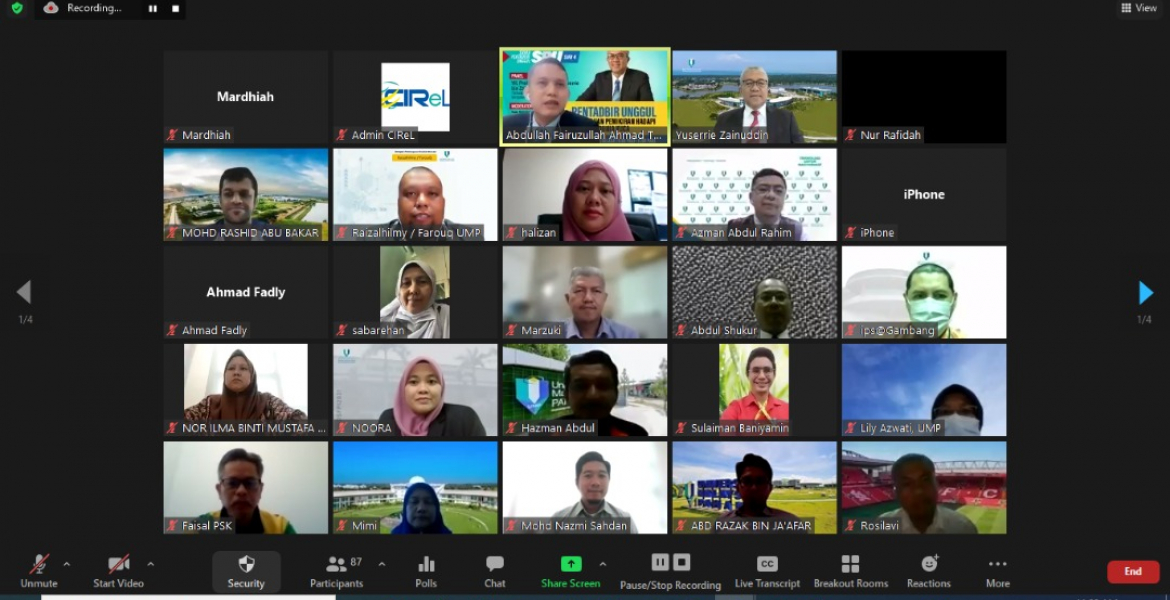Administrators need to be prepared to face VUCA world
PEKAN, 26 October 2021 - The management of higher education organisations today should be rejuvenated so that the university can produce graduates who are skilled and relevant to the field of future employment.
Information dumping and technological advancements with the presence of the VUCA world are expected to transform the landscape of higher education, which will also impact future generations.
The use of VUCA reflects the unstable state of the world: volatility, uncertainty, complexity and ambiguity.
It relates to an uncertain, unclear, and overly complex environment, in which many elements and variables need to be taken into account.
The situations of economic recession, pandemic and so on, as well as organisational changes, also need to be given attention.
Operating in the environment of this VUCA world makes it compulsory for administrators and the management to be prepared to cover their respective capabilities to face the ever-changing environment characterised by VUCA.
According to the Deputy Vice-Chancellor (Student Affairs & Alumni), who acts as the Vice-Chancellor of Universiti Malaysia Pahang (UMP), Professor Dato’ Dr. Yuserrie Zainuddin, if we do not take heed of this VUCA issue within our scope, it will be considered obsolete which leads to the old way of acting and solving problems.
“Let us not get lost in the VUCA world just because we are late in understanding the change, slow to act and slow to change until we lose direction and become irrelevant in this ever-changing situation.
“We need to look at the variables and parameters that can affect us.
“The environment involved will affect the way we work, make decisions and manage the surrounding situation, and in fact, if we fail to take note, we will continue to be left behind,” he said.
Therefore, to achieve this, he said, the world of higher education needs to innovate to create flexible, dynamic, creative, innovative and intelligent learning characteristics to create an independent, creative and competent learning atmosphere that is no longer trapped in just one scope.
“Organisations are divided into static ones that disregard external influences and organic ones that accept the environment as a threat or an opportunity to advance.
“With agility, we can show how we are capable of acting immediately in the face of environmental changes.
“In this COVID-19 pandemic era, as an organisation, each individual needs to play a role and influence each other,” he added by explaining the situation when UMP was given the responsibility to manage students returning to their hometown when the country was hit with the COVID-19 pandemic.
He said, at that time, UMP was tasked with the responsibility to manage the safe return movement of students not only from Pahang but also from Terengganu and Kelantan, as well as dealing with many parties and external agencies, including authorities such as the Royal Malaysia Police (PDRM), Malaysian National Security Council (MKN) and others.
“Communication technology helps tremendously in facilitating quick action in decision making.
“Based on a study conducted, they found that in the past, only employees in the telecommuting field worked from home (WFH), which involved 25 per cent of the communications (IT) staff.
“However, when the pandemic hit, almost 100 per cent work from home, except for essential services,” he said.
He added that this pandemic is a threat not only to the spread of diseases that affect health but also to the way we work with technological advances and communicate rapidly.
“It also affects the economy and society.
“In preparation for the VUCA world, several strategies need to be addressed by setting a clear vision to strengthen a good direction.
“Administrators need to always share knowledge, work in a team, practice transparency and have the agility to continue to move forward,” he said.
Professor Dato’ Ts. Dr. Yuserrie further explained, among other things, for example, changing the status quo for self-care and, in case of ambiguity, action should be performed deftly and managed well.
“The new norm requires us to identify threats and preparations.
“We need to manage time well and take immediate action. Similarly, in the form of organisational structure, the needs of staff in the organisation must consider the need for digitalisation to always be relevant as a preparation in the VUCA world.
“Furthermore, we need to manage customer needs responsively, manage communication and bureaucracy as well as evaluate the management process.
“Listen more, be innovative, be flexible, be prepared,” he said.
Facing this VUCA world, the outlined FASTER principle, which is being open (flat), facilitative and friendly service delivery (agile), adaptive and sensitive to current needs (streamlined), creative with the use of technology/digital IR4.0 (tech-enabled), efficient with minimum cost, maximum yield and inability to accept errors (efficient) and firm with the administration and services (resilient) can be implemented by administrators in carrying out the trust and responsibility of effective service delivery.
Professor Dato’ Ts. Dr. Yuserrie was present at the Suara Pentadbir Unggul (SPU) Series 4/2021 Programme titled ‘Excellent Administrator: Changing Mindset in Facing the World’ organised by the Human Resource Development Division, Registry Department, which took place online today.
The programme saw Senior Executive of Information Technology, Centre for Information and Communication Technology (PTMK), Haji Abdullah Fairuzullah Ahmad Tajuddin moderated the special programme of Vice-Chancellor with UMP administrators.
This programme was an engagement session between the university management and administrators in analysing and conveying the university aspirations to elevate university administrators’ role towards organisational excellence.
In addition, the programme also aimed to create an intellectual space for administrators to exchange views and opinions in line with the core values and strategic direction of the university.
By: Mimi Rabita Abdul Wahit, Corporate Communications Unit, The Office of The Vice-Chancellor
Translation by: Dr. Rozaimi Abu Samah, Engineering College/Faculty of Chemical and Process Engineering Technology
- 98 views



 Reports by:
Reports by: 






